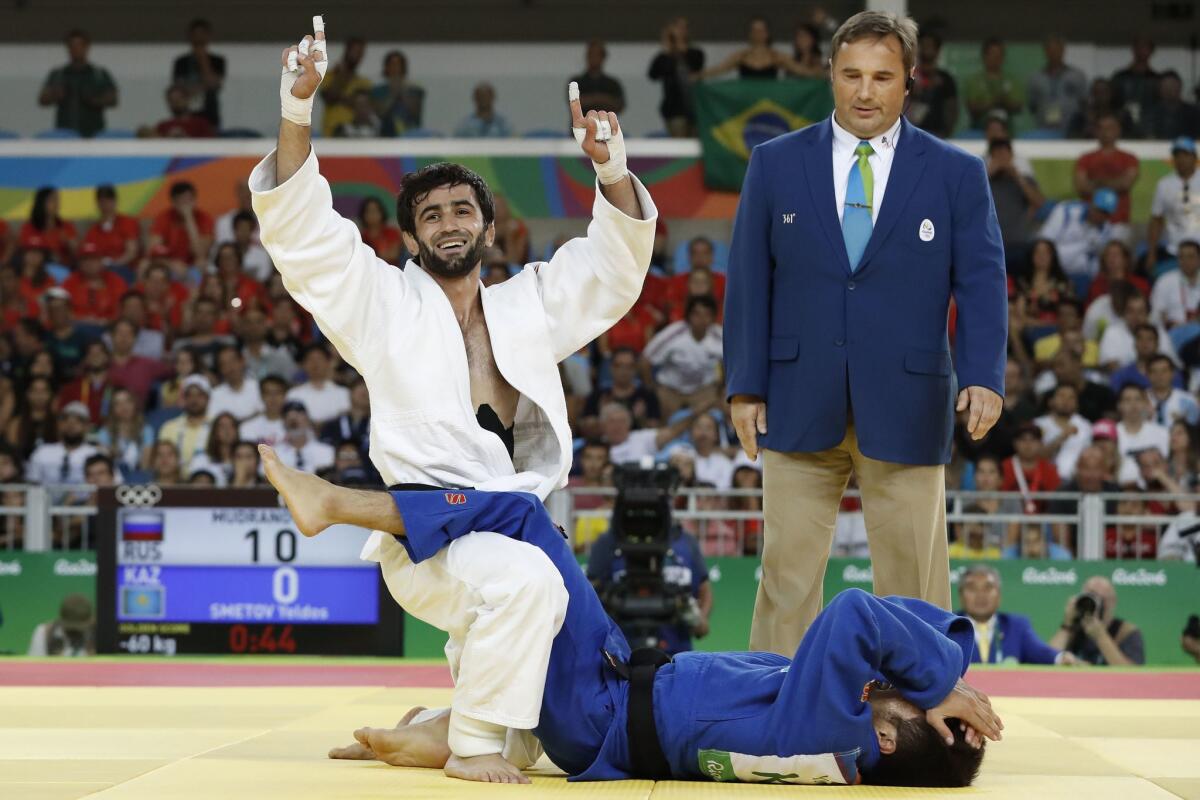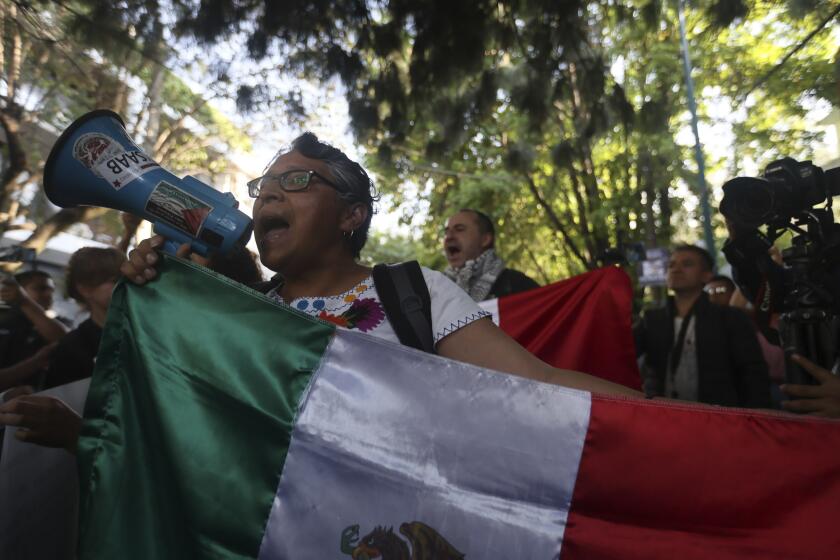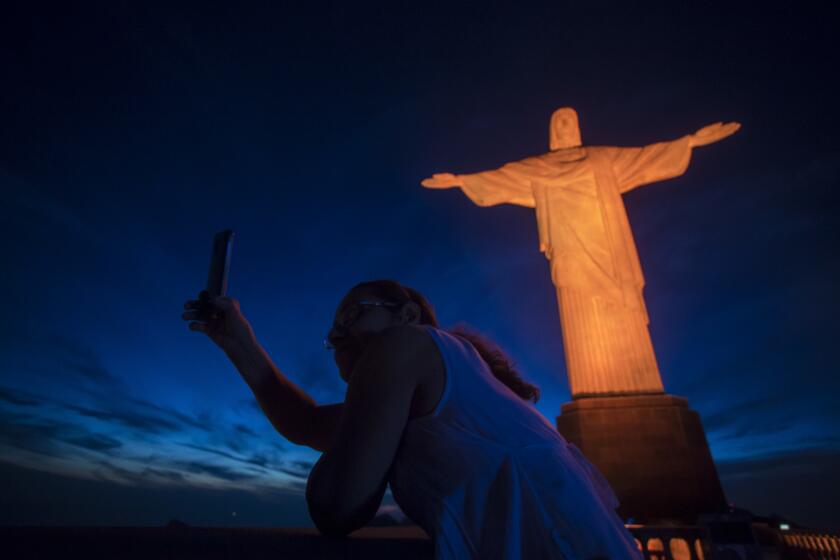Spirits are low at Russia’s Olympics party house, with fans grumbling that doping bans are unfair

As Beslan Mudranov walked into the Marimbas Yacht Club overlooking Copacabana beach the other day, he was met with hushed awe.
A dozen or so photographers, VIPs and fans respectfully followed as Russian Olympic Committee President Alexander Zhukov led the gold medalist judoka on a tour. This month, the luxury venue is rented out by the federation and renamed the Russia Fans House.
The walls were decorated with massive photographs of Russian synchronized swimmers, gymnasts, and fencers — some of the sports in which the country was allowed to compete.
There was no sign of track and field or weightlifting, events from which all Russian athletes were banned for what the World Anti-Doping Agency determined was years-long systematic and state-sponsored doping.
As athletes and dignitaries made their way to a VIP area near stage, Max Konovalov, one of many volunteers handling logistics, translation and other tasks, took a seat by himself and glanced at a menu.
“It’s obviously wrong what has happened to us,” he said in English. “It’s sad.”
“It’s also obviously political. But what can we do? We keep cheering.”
Mudranov, Russia’s first medalist here, finally took the stage as a few dozen Russians on the patio and mezzanine chomped on Brazilian crab appetizers and Russian pelmeni dumplings.
“It’s his family!” somebody shouted in Russian from the upstairs lounge. Sure enough, a large screen beamed in a Skype call from a few of Mudranov’s relatives back home warmly expressing their pride.
Two less-than-enthusiastic teenagers stood in front of the stage slowly waving the Russian flag. As the national anthem started to play, a big-bellied middle-aged man instructed the few non-Russians to stand.
“Be glorious, our country!” the crowd belted out. “We are proud of you! From the southern seas to the polar lands.”
Mudranov awkwardly addressed what many of his countrymen were grumbling about. “Everyone knows what kind of situation there was,” he said. “None of us has broken down as a result of this.”
After the International Olympic Committee announced the sports from which Russian athletes would be banned, it wasn’t clear the country would win any medals.
The decision cut the number of Russian athletes competing here from 389 to 271. Even the victories — as of late Wednesday afternoon, Russia had collected 13 medals — seemed strange given the situation.
Among the crowd at Russia Fans House, it was impossible to find anybody who thought that geopolitics hadn’t played some role in the bans or that Russian athletes had been treated fairly.
“Would this happen to American athletes?” said Nadia Levina, an accountant from Moscow. “That they’d deny a young kid the right to compete even if there was no proof against that individual? Never.”
“Lots of athletes in the U.S. dope,” she said. “It’s not fair.”
Russia’s revenge would come in the form of medals in the sports not affected by bans, she added.
The next day, the Russian women’s archery team earned cheers from the crowd with each bull’s-eye and won a silver medal. The South Koreans, who have dominated the event for decades, took the gold.
After the medal ceremony, an American journalist approached one of the Russian archers, 20-year-old Tuyana Dashidorzhieva, with a question: How did she feel about the ban?
The interpreter prefaced it with an apology: “Excuse us, but the question is of course about doping and the scandal.”
Dashidorzhieva paused, then criticized the ban and how Olympic officials had waited so long to reach a decision: “Of course we can’t agree with the decision. We were in a very uncertain condition, training every day but not knowing if we would actually come. Dangling in the air.”
She said she was especially angry that all Russian Paralympic athletes were banned, regardless of individual test results.
“We do think politics has something to do with it somehow,” she said, “but I would rather not comment on that part.”
But a group of Russians looking for a party not far from Russia Fans House didn’t hold back.
“This is about Putin and Ukraine, and it’s about the West’s attitude to Russia,” said 28-year-old Vladimir Suvorov, who grew up in Canada. “There are sanctions against Russia, and this is another one. It’s a way to bring Russia down.”
Bevins is a special correspondent.
MORE OLYMPICS NEWS
Brazil is struggling to keep the Olympics free of politics
Rio Olympics: Overweight, slow Ethiopian swimmer draws attention
China racks up medals, and a list of perceived slights, at Rio Olympics
More to Read
Start your day right
Sign up for Essential California for news, features and recommendations from the L.A. Times and beyond in your inbox six days a week.
You may occasionally receive promotional content from the Los Angeles Times.






